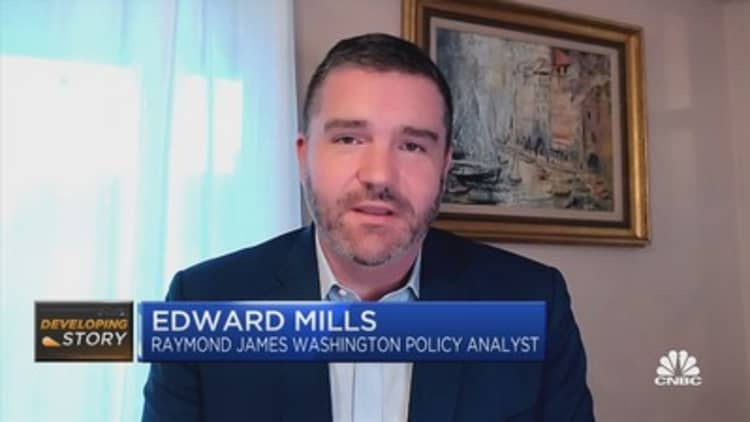New Chinese laws on espionage and foreign relations took effect on July 1.
Vcg | Visual China Group | Getty Images
BEIJING — For foreign businesses in China, geopolitics hold more sway than new Chinese laws, according to analysts.
National security is a growing priority for the country. Two new laws, one on espionage and the other on foreign relations, took effect July 1. They contain catch-all phrases such as “state secrets” that are open to interpretation by local and central authorities.
Adding to the worries of those considering doing business in China is news earlier this year of three raids on international consulting firms with little public explanation.
In strictly legal terms, however, the legislative changes themselves don’t increase the risk for foreign businesses in China, said Jeremy Daum, senior fellow at Yale Law School’s Paul Tsai China Center.
Rather, he said, “the current international relations climate and competing political pressures may be making some businesses re-evaluate their cost-benefit analysis in accepting the risks of doing business in China.”

U.S.-China relations have deteriorated over the last several years, after decades of increased engagement.
High-level dialogue beyond the presidential level has only resumed partially this year with U.S. Secretary of State Antony Blinken’s visit to Beijing, among others.
“The current environment lends itself to more occasions where a regulator or someone in the government in China may choose to take action that is non-transparent. That creates a risk for U.S. business,” said Michael House, partner at Perkins Coie and based out of offices in Beijing and Washington, D.C.
“And when there is no real opportunity for the two governments to talk about the reason for that action or at the government level try to get some better read on what’s motivated those kinds of actions, that becomes then detrimental for U.S. business when that kind of opportunity doesn’t exist,” House said.
When it comes to industries, he pointed out, advanced technology and its links to the military are a concern to the U.S. and China, while other sectors bear less risk.
The new laws
The new Espionage Law expands the “acts of espionage” definition to include “seeking to align with an espionage organization” and attempts to illegally obtain data related to national security, according to an English-language translation on China Law Translate, a website Daum founded.
The law also calls on “all levels” of government in China to educate and manage related security precautions, according to the translation.
The website’s translation of the Foreign Relations Law notes that foreign organizations in China “must not endanger China’s national security, harm the societal public interest, or undermine societal public order.”
Corporate disconnect
The Chinese approach [to national security] is more defensive and domestic while the U.S. understandings are very global.
Alex Liang
Anjie & Broad, partner
Michael Hart, president of the American Chamber of Commerce in China, said he’s brought up the corporate raids in his meetings with Chinese officials.
“This is one of the disconnects where we usually hear, is as long as you’re not doing anything illegal you have nothing to worry about,” Hart said. “But it’s unclear to us what these companies did that was considered illegal. We continue to call for more transparency.”
Blinken and U.S. Treasury Secretary Janet Yellen have both met with U.S. businesses in China during their visits this year.
Companies also face increased scrutiny on the U.S. side. A House committee delegation discussed China business in their meeting with executives of high-profile U.S. tech and media companies in California in April.
National security
The term national security has been increasingly cited by the U.S. and Chinese government in new restrictions for businesses over the last few years.
For businesses in China, the biggest concern is that everything from food to energy is given a security angle, Jens Eskelund, president of the EU Chamber of Commerce in China, said at a briefing in mid-June.
“That I think creates uncertainty about what are the exact borders between what falls under a security purview and something we can operate as normal businesses.”
Cultural and language differences also play a role.
“The Chinese approach [to national security] is more defensive and domestic while the U.S. understandings are very global,” said Alex Liang, partner at Anjie & Broad in Beijing.
“For example, China generally focuses on whether sensitive information is leaked across the border, while U.S. normally focuses whether its allies provide technology to its rivalries and certain target nations,” he said.
The role of law and the court system also have fundamentally different statuses in the U.S. and China. Beijing has been trying to build up its legal system in recent years, but the government is ruled by one party.
Perkins Coie’s House pointed out that since the U.S. courts are able to rein in what the enforcement part of the government is doing, a Chinese company could make a legal dispute about national security-driven actions — something difficult for a foreign company to do in China.
He said foreign businesses in China could also consider having more dialogue with their local regulators, so they have a better understanding of what a company is doing and how it’s contributing to the economy.
China’s Ministry of Commerce on Wednesday met with foreign pharmaceutical companies, and said it would hold regular roundtables with foreign businesses to support their operations.

